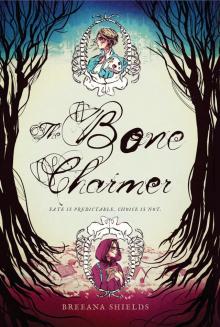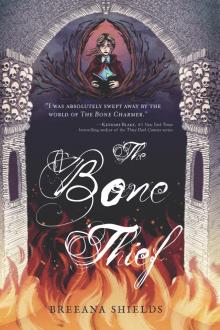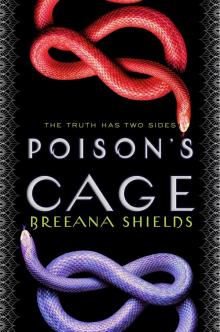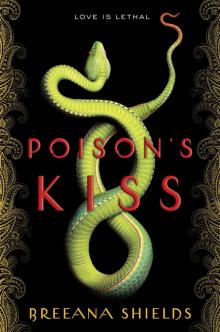- Home
- Breeana Shields
The Bone Charmer Page 4
The Bone Charmer Read online
Page 4
“How’s the new apprenticeship going?” I ask.
Her eyes flick to Master Oskar, who raises one hand in the air without looking up from the bone he’s brushing. It seems that’s as close to permission to take a break as Ami’s going to get.
“It’s going well,” she tells me. “But there’s so much to learn—thousands of ways to prepare bones depending on who needs them and what they’re being used for. I’m afraid I’ll never remember it all.”
“Of course you will,” I tell her. We sit on a long wooden bench on the far side of the room. Bones are everywhere—spread across the counters, soaking in jars filled with clear liquid, drying on shelves after they’ve been freshly painted to replicate the tattoos their owners wore. The center of the room is filled with tables in various shapes and sizes, all of them laden with open books and stacks of paper. Being here reminds me of why bones are so expensive. So much goes into getting them ready for use—from the caretaker of the Forest of the Dead, to the handlers who clean and prepare them, to the traders who bring rare supplies from the far reaches of the country and beyond.
“Have you started tutoring yet?” Ami asks.
I shake my head. “No, but soon. Audra and her son are vacationing in the islands. I’ll start when they get back.” I hand Ami the scrap of paper, not quite meeting her eyes. “My mother needs supplies for some work she’s doing.”
Guilt worms through my stomach. Ami is the one person who knows my every secret, the origin of my every tattoo. Like the pink crescent-shaped mark that emerged on my left hip after a gust of wind blew my skirt above my head during a game of Dead Man’s Prisoner; the other children joked about my “blushing cheeks” for weeks afterward. And the tattoo behind my right knee—a flame, tinged with hues of red and orange that blazed onto my skin after the most frightening experience of my life.
Ami has always been the person who listened to my worries and laughed at my jokes. When Gran died, and later Father, Ami was there to help shoulder my grief. Even my mother couldn’t reach me then—her heart was too full of her own suffering to bear mine as well.
It hurts not to tell Ami what happened at the kenning, but I promised I would stay silent. If the town council found out about how my mother had Gran’s bones infused with extra magic, she’d face a tribunal. Still, the secret lodges behind my ribs, an uncomfortable pressure that reminds me that we can’t share everything anymore. The loss stings.
Ami studies the list I gave her. She grabs a basket and mumbles to herself as she collects tiny glass jars and pouches of powder from the drawers behind the counter. She pulls out a tool with a smooth wooden handle and a sharp, pointed end and drops it in the basket.
“What is that?” I ask.
She answers without looking up. “It’s called a pinner. It makes tiny holes in the bones so the preparation solutions can penetrate more easily.”
And then she comes upon an item that makes her pause.
“Master Oskar,” she says, “where do we keep essence of horse hoof?”
For the first time since I got here, the man lifts his head. “Who’s asking?”
Ami’s glance skips from me to him and back again. “They’re for Della Holte …,” she says. “The Bone Charmer.”
He grunts. “I know full well who Della Holte is. What I want to know is what business she has with essence of horse hoof?”
The question hangs in the air. My pulse rushes in my ears.
“I don’t know,” I say finally. “I’m afraid she didn’t say.”
He narrows his eyes, and for a moment I think he’ll refuse me. Then he shoves back from the table, his chair scraping loudly against the wood floor. He fumbles behind the counter, opening and closing a half dozen of the hundreds of small drawers that line the back wall before finally finding what he’s searching for. He deposits a small brown pouch into the basket, along with my other items.
I count out several coins and drop them into his outstretched hand.
He frowns. “I can’t think of what a Bone Charmer would need with that.”
“I wish I knew,” I tell him. And it’s the truth.
“We need to trick the bone into thinking it’s inside a body,” my mother says when I return with the supplies.
I give her a blank stare.
“A living body,” she clarifies, as if that were the source of my confusion.
“And how do you plan to do that?” I fall into the chair beside her.
Bottles and pouches are spread out across the kitchen table. My mother picks up each of them, one by one, and examines the contents.
“I considered implanting the bone in my own abdomen,” she says, “but then we’d have no way to know if it’s healing—the bone, I mean, not my abdomen.”
I gasp. “Mother! You can’t be serious.”
She shrugs as if she finds my squeamishness immature. “Bones have special properties. Inside a living body, they will mend themselves.”
“Well, sure, if someone falls from a tree. But this seems”—I grapple for a way to express myself—“not the same as that.”
She tucks a strand of pale hair behind her ear. “We’re going to make the bone believe it’s the same.”
“So, what is all this for?” I pick up one of the bottles, and the liquid inside sloshes around. “Since we’ve ruled out slicing you open.”
“We’re going to make a nutrient solution,” she says triumphantly.
I raise my eyebrows.
“Don’t just sit there. Help me.”
She goes to one of the cabinets in the kitchen and starts removing things—a bowl, a spoon, a mortar and pestle, a clear container made of glass.
“Fill this and put it over the heat,” she says, handing me a pot.
Once the water comes to a boil, we add sugar, salt, and the ingredients I brought from the bone house—a bit of bone dust, the essence of horse hoof, a small vial of tears. And then my mother pulls a sewing needle from her pocket.
“Give me your hand,” she says.
I sigh. “Why do you always need my blood?”
“Your blood is powerful,” she says, pricking both of our fingers.
“No, your blood is powerful. Mine is only ordinary.”
She freezes, one hand cradled in the other, a single drop of blood bright against her ivory skin. I wait for her to correct me. To repeat what she said at the kenning when she implied that I might have Second Sight. Or at least that’s what I think she implied. I’ve been itching to ask her about it ever since, but she’s been so focused on finding a way to heal the bone, I haven’t dared. But she doesn’t correct me.
“All blood is powerful,” she says, finally.
We hold our hands above the pot and let a few drops fall, turning the liquid light red. While I stir the solution, my mother uses the pinner to poke several tiny holes in each half of the bone.
“Is that thickening?” she asks.
“I think so?” I lift the spoon from the pot. The liquid has congealed to something resembling jelly.
“Perfect,” she says, taking the pot from me and pouring the contents into the glass container. She fits the two halves of the broken bone together and pushes them into the slightly gelatinous substance.
“What now?” I ask.
My mother wipes sweat from her brow. “We wait.”
I press a palm to my sternum and think of the tattoo there—a curve like the string of a tightly pulled bow, a line running through it like an arrow. It appeared right after my gran died as a deep midnight blue. When my father died, it turned black.
“Can I tell you something?” I ask.
My mother’s expression of surprise sends a jolt of guilt through me. I used to tell her everything, but as the kenning got closer, I pushed her away. The possibility of being matched as a Bone Charmer when I knew magic wasn’t safe with me—when I would dishonor both her legacy and Gran’s—weighed on me like a cloak of iron.
“Of course,” my mother says, her voice a little too d
eliberately nonchalant. “You can tell me anything.”
“I’m afraid of what will happen if the bone heals.”
“You mean if it doesn’t heal?”
I shake my head. The thought of two different versions of myself wandering around Midwood is frightening, but imagining a version of myself suddenly winking out of existence terrifies me. “No,” I say, biting my lip. “I don’t want this version of myself to disappear.”
“Oh, Saskia.” My mother folds me in an embrace. She smells of vanilla, and it’s so reminiscent of my childhood that I can’t help but sink against her. “I don’t think I’ve been entirely clear, love. If the bone doesn’t heal, all of your futures will disappear.”
I pull away from her. “How is that possible?”
She presses her lips together. “I did something I shouldn’t have,” she says. “I used a magic that—it’s expressly forbidden, and if the council finds out about it …”
“What?” I ask. “What did you do?”
“Bone reading is subjective. I wanted your kenning to be flawless.” She sighs. “I infused the kenning bones with your essence.”
“I don’t understand. You always infuse the bones with my essence.” I think of the hundreds of times my fingers have been pierced in service of one reading or another.
“No,” she says. “I had the bones prepared with your blood. And mine and Gran’s as well.” I remember now what she said at the kenning, that she infused them with extra magic so she could see my future more clearly.
“What were my other paths? What were you choosing between?”
Her eyes slide away from me as she answers. “I’m sure your first kenning had many possibilities, but you know I couldn’t see the other half of the bone once it broke.”
“But still you saw more than one future, didn’t you?”
She sighs. “You know I can’t tell you that.”
“Why not? It doesn’t seem like you’ve been sticking strictly to the rules here.”
She shakes her head. “It’s not healthy to know too much about your own future.”
My jaw falls open. “Are you serious? Do you have any idea how that sounds coming from you?” My whole life has been built around knowing everything about my future.
“It’s not the same,” she says. “There’s a reason Bone Charmers can’t do readings on themselves. Knowing too much changes your decision-making, alters your path. I can’t tell you what I saw, Saskia. I’m sorry.”
“You said …” I swallow. “At the kenning you said something about three generations of Bone Charmers?”
“I matched you as a tutor,” she says softly.
“But—”
“I believe it was one of your possible paths, yes,” she says. “I can’t tell you more than that. Your kenning is final. You can’t go through the binding ceremony now, and you’ll never be a Bone Charmer. Not in this life.”
A spasm of relief goes through me, knowing that without the binding, my potential for magic will slowly fade.
“So the bones weren’t infused with the blood from three generations of Bone Charmers?”
She twists her hands in her lap. “Not in this reality,” she says. “They’re infused with the magic of two Bone Charmers and a tutor. Which makes them much more fragile than I wish they were.”
“And if it doesn’t heal …”
“Your fate is now intertwined with the bone. I’m so sorry, Saskia. After the kenning, I planned to lock the bones away. They would have lasted for generations. I never anticipated that one would break.”
I feel as if the floor has shifted beneath my feet. I find the courage for one more question: “What about the bone in my other reality?”
“Now, that bone might be infused with the blood of three generations of Bone Charmers,” she says, “which would make your two paths very different. Every alteration has the potential to change the future in both big and small ways. Perhaps, in that reality, I’ve thought of a different solution to make things right.” She strokes my cheek with the backs of her fingers. “I can only hope I’m wise enough to fix it in one of them.”
Saskia
The Bone Charmer
Ivory Hall sits high on a hill just below the first fork in the Shard. It’s a massive structure—white and gleaming, with hundreds of windows and dozens of square towers that stretch toward the sky. Four broad lanes spill down the hill, the closest of which runs parallel to the port where our ship is docked.
All the apprentices crowd on the deck, elbowing for a better view of both Ivory Hall and the pier. I press against the railing, as eager for a glimpse as the others. Rows of ships identical to this one are docked all along the shore.
Seagulls circle overhead in patterns that look too structured to be accidental. Onshore, I see several people in green cloaks, delicate bone flutes pressed to their lips, playing while they look skyward. A white stripe on each sleeve designates them as members of the Ivory Guard, but I can’t think why musicians would be needed for protection. I study them for several minutes before I realize they must be Watchers—some of the select members of the Ivory Guard who also have bone magic. My father told me about them when I was small.
“Papa, if you could have any magic, what would you choose?” I asked him once. It was my bedtime, and the question was more of a stall tactic than actual curiosity. But he played along, as he often did.
“I’d be a Watcher,” he said.
I’d scrunched up my forehead then. “No such thing.” I knew all the magics had “bone” in the title. Bone Charmers, like Mama and Gran, Bone Masons, Bone Breakers, Bone Healers.
“Ah, but you’re wrong, bluebird. The official title is Bone Singer,” he said. “But that’s not a very serious name for someone tasked with defending a country, now is it? They like to be called Watchers instead. Much more impressive.” And then he told me about people who could control animals through song.
The Watchers are guiding the birds, seeing through their eyes to get a better view of the activities below. Huge white dogs pace along the shoreline and up and down the pier. Their owners stand at a distance, clothed in the same green cloaks but playing larger instruments. The flutes must be made from the bones of the same type of animal being controlled. I think of Ami back in Midwood, apprenticing at the bone house, and a pang goes through me. I wonder if she’ll learn to prepare bones so Masons can carve them into flutes.
Someone squeezes in beside me and I glance over to see Bram. He’s been avoiding me for our entire journey, but maybe looking out across the capital, he feels it too—how everything is different here, how home suddenly seems so far away.
“Hello,” I say.
He lifts his chin slightly, without answering, as if we’re strangers exchanging pleasantries, instead of two people from the same town. As if we’re not bone-matched.
I sigh and search for my patience. “Are you nervous?”
His dark eyes roam over my face. “Why? Because I’m too much of a coward to show up and deal with my fate?” He grips the railing so tightly that it turns his knuckles white. His black tattoos stand in such sharp relief that they practically leap off his skin.
My cheeks burn. “I didn’t mean—” But he doesn’t let me finish.
“Yes, you did.”
One of the crew members lowers the ramp and announces that it’s time to disembark. Bram turns his back on me and soon he’s lost in the throng.
The pier is a riot of color and noise. Vendors selling food—long skewers threaded with tender chunks of meat and crisp vegetables, delicate bowls made from spun sugar and filled with ripe berries, bite-sized morsels of sweet bread.
Merchants walk along the pier, boxes slung across their chests, peddling their wares. They sell little toy flutes made of wood and painted white, sets of pretend bones so children can playact the kenning, and even bits of shell and teeth that are mostly worthless except for mundane readings like choosing fish bait.
Kastelia City is a trading hub, and sn
atches of conversation from beyond our borders float past me in languages I don’t understand—the melodic long vowels of Cistonian, the guttural, harsh tones of the people of Novenium, and other tongues so unfamiliar that I can’t place them.
Each of the ships in the harbor seem to have unloaded their passengers at the same time, and soon a horde of apprentices are all pressing forward, climbing toward Ivory Hall. I’m caught in a swiftly moving wave of people, and I can only trust that someone at the front of the crowd knows where we’re headed.
The lane is steeper than it looks, and it’s not long before the muscles in my legs are on fire. By the time we make it to the top, the afternoon has faded away. The sun dips toward the horizon, and soft pink light colors the sky.
A woman stands on a tall box, shouting directions and signaling for the group to gather around. Her silver hair is braided and rolled into a tight bun at the back of her head, and she has a yellow half-moon–shaped tattoo on the side of her neck. Both her voice and mannerisms suggest she’s not someone to be trifled with. She reminds me a bit of Gran.
I crane my neck to get a better view of Ivory Hall, but we’re too close now, and the structure is too massive. All I can see is a solid wall of white stone, broken only by a huge set of arched double doors made of iron and inlaid with branches that mimic the Shard River.
Once we’re all assembled, the woman holds up her hands and the excited chatter dies away. “My name is Norah,” she says. “I’m Steward of Ivory Hall, and I’ll be making sure you get settled in today with a room assignment and your training schedule. If you’re apprenticing in one of the bone magics, you’ll also see plenty of me in your seminar classes.”
She motions toward a younger man, standing off to the side. “If you are apprenticing in a standard specialty, please follow Jonas to the back entrance. Bone magic apprentices will follow me.”
Norah steps off the box, scoops it under her arm, and walks purposefully toward the front door.
The group peels apart—the majority following Jonas, and the rest of us hurrying to catch up with Norah. Bram falls in step beside me and I turn to him, confused. Was he not listening?

 The Bone Charmer
The Bone Charmer The Bone Thief
The Bone Thief Poison's Cage
Poison's Cage Poison's Kiss
Poison's Kiss